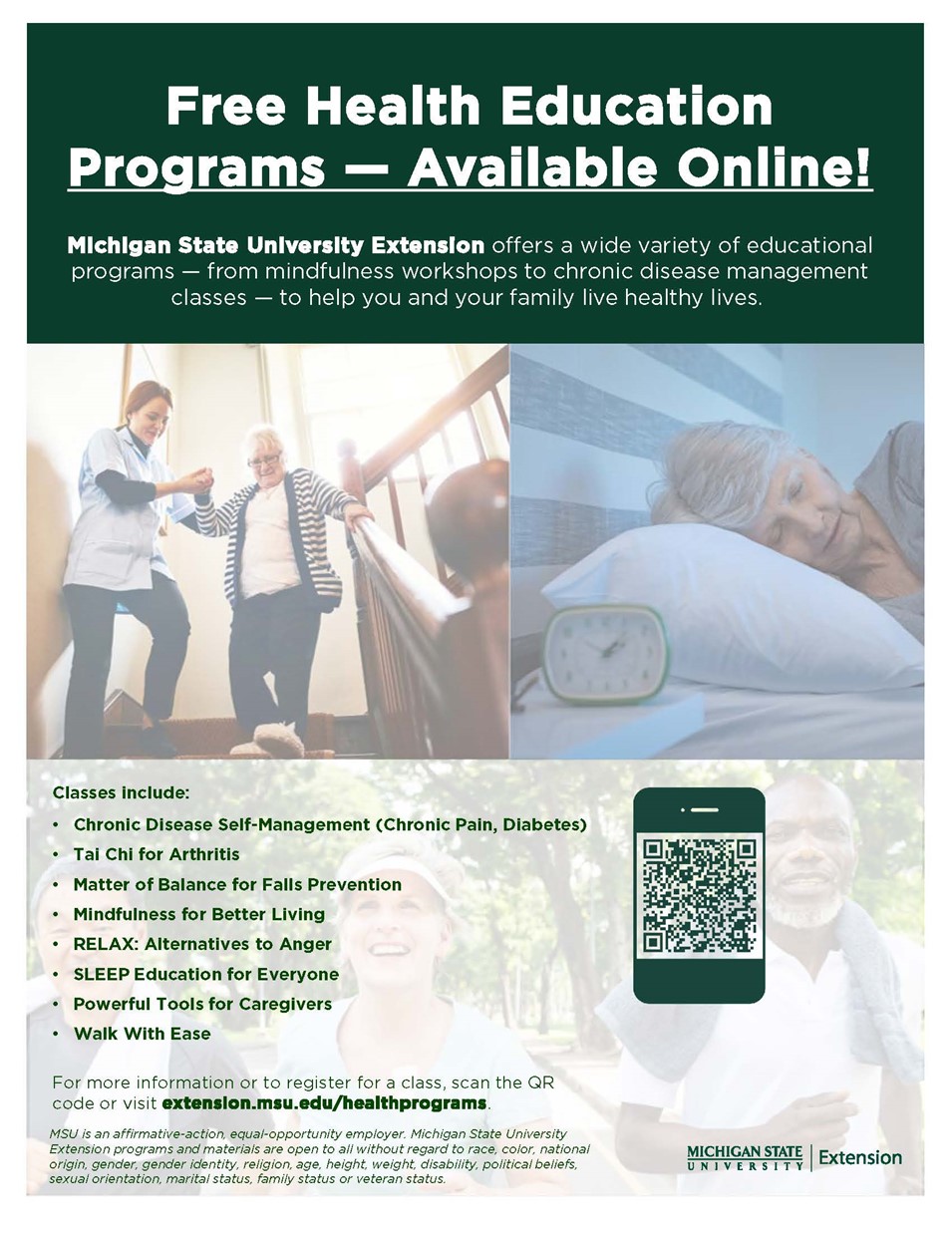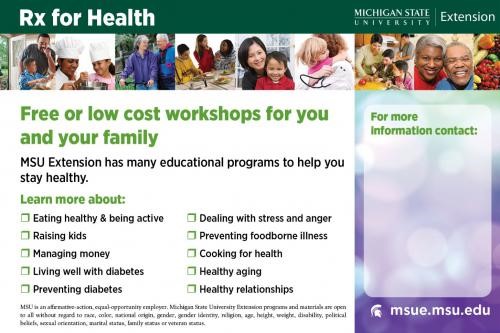Clinic-Community Connections
MSU Extension and primary care can partner together to connect patients to community-based education.
Part of transforming healthcare is to help patients engage in prevention strategies and learn self-management activities related to maintaining and improving their health. Community-based education, especially programs that increase self-efficacy, help people improve their self-management of chronic condition symptoms such as pain, and can enhance the daily lives of adults as they age. Referrals from physicians for patients to seek health and wellness educational programs in their community can also help address social determinants of health.
MSU Extension’s marketing materials include the referral link and associated QR code for Michigan residents to find health classes available to them. MSU Extension is a partner with primary care providers and service organizations such as disability networks and Area Agencies on Aging to promote free community-based health classes. If you are interested in partnering with MSU Extension, contact us for free printed posters, post cards, and program brochures that can be shared with your patients or clients.

Physicians’ Sharing Strategies for Patient Referrals to Extension’s Health Programs
To assist our goals of effective outreach to new healthcare audiences, MSU Extension collaborated with a national partner who also works to transform healthcare. A survey project conducted by the American Medical Association and MSU Extension revealed how familiar physicians are with Cooperative Extension programs and what factors make referrals to community-based education more or less likely. The physician survey sample included licensed providers involved in direct patient care within Michigan. The results suggest that we need to create greater awareness of Extension programs. Thirty percent of physicians surveyed had no familiarity with any Extension programs; forty-five percent were “somewhat to very familiar” with at least one Extension program, and this was most commonly the national diabetes prevention program. Just over half (55%) of the physicians in this sample were currently referring patients to community-based education. There was a pattern for physicians in medium-sized and larger practices making more referrals than smaller practices.
Overall, physicians have positive attitudes about how educational programs help patients, such as, building a supportive network of peers and community, gaining access to health literacy and health promotion tools, increasing awareness of the essential medical testing, and improving knowledge about health conditions. Physicians also shared perceived barriers, such as their limited knowledge about programs and inadequate availability of programs in communities. If physicians were not familiar with programs, they also reported having limited knowledge and evidence to make referrals. Therefore, it appears that not making referrals is more related to a lack of familiarity with the availability and outcomes of community-based educational programs, and less connected to inadequate resources or time to make referrals. Other conclusions from the physician survey suggest Cooperative Extension promotes the following as facilitators to community-based education referrals: adequate availability of programs, setting up methods for communication and coordination, providing progress reports, allowing health care providers to meet program staff, and sharing established evidence of program outcomes.
To learn more about connecting primary care to community-based education and to read about Michigan physicians’ familiarity with Extension programs, visit: https://journals.sagepub.com/doi/10.1177/1524839919868980
Past efforts at MSU Extension included the “Rx for Health” toolkit that included printed tear off prescription paper pads to distribute to patients for telephone-based referrals, and two guides: one for health care providers and one for Extension staff. Guides covered how to talk with healthcare providers about the referral pads and detailed information about the efficacy of Extension health programs being offered.
Rx for Health: The original paper-based and telephone referral system
Developed and in use by MSU Extension from 2014 to 2019, the Rx for Health Referral Toolkit and Pad was a paper-based tool that healthcare providers and MSU Extension educators used to increase patients’ awareness and use of MSU Extension's free and low-cost community-based health education programs. Rx for Health was designed to help healthcare providers in building or maintaining a patient-centered medical home model of care (PCMH), since PCMH designation requires that patients are referred to community and social services. Rx for Health was found to be a simple and cost-effective way to achieve program referrals.
In 2020, MSU Extension transitioned from a paper-based referral system to an electronic referral system to increase program referrals. There were many lessons learned in implementing Rx for Health and there remains intrinsic value in the materials and processes that were created.
Outcomes from the Rx for Health pilot project which details the implementation and success of the paper-based and telephone referral toolkit are published.
Tiret, H., Eschbach, C. L., & Newkirk, C. (2019). Rx for Health Referral Tool Kit techniques to promote Extension programs. Journal of Human Sciences and Extension, 7(3), 173-185. https://scholarsjunction.msstate.edu/jhse/vol7/iss3/9/




 Print
Print Email
Email